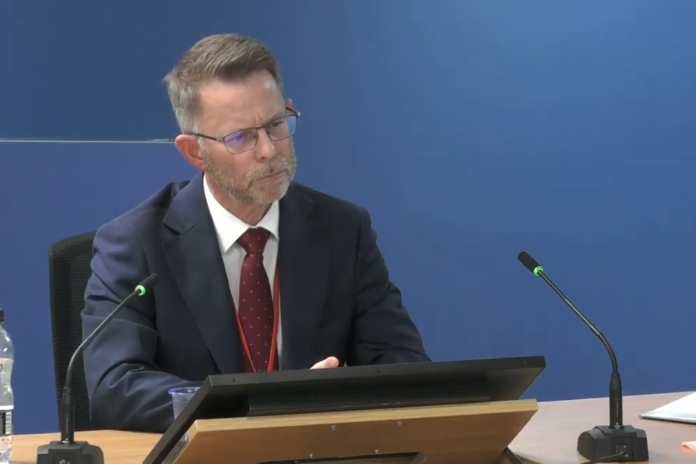
The employer’s agent who worked on the Grenfell Tower refurbishment for the final few months of the project became “frustrated” by Rydon’s performance and complained that the work didn’t seem to be “important” to the main contractor, the Grenfell Tower Inquiry has heard.
Counsel to the Inquiry Kate Grange QC heard from witness Neil Reed from Artelia, who took over the role as employer’s agent at Grenfell from Philip Booth in March 2015 when there were just a few months left until practical completion.
Reed said that at the time he took over, the project was “in some delay” and “in distress”.
When he came on board, Max Fordham had been retained as M&E engineer, while architect Studio E had been novated to Rydon. Reed said he understood that the client design adviser role that Artelia offered to the Kensington and Chelsea Tenant Management Organisation (TMO) had been declined and that the TMO and Claire Williams, its project manager, had decided to perform that function themselves.
Reed said his first impressions of Rydon and of contracts manager Simon Lawrence were “pretty good. “He [Lawrence] was someone that was very easy to talk to. I mean, the project was in some significant delay, and I very quickly gained an insight into what I saw as the key issues for the project,” Reed said.
He explained: “There were two key issues for me. The delay itself, which I think was one issue. There appeared to be significant change, ongoing change, which would be quite unusual in month nine of a construction project. That’s going to cause some challenges and some issues for the team to manage. But my immediate concern in terms of looking at the sort of broader, high-level issues were the lack of access to flats, that it became very apparent to me very quickly were going to cause a significant problem for TMO, and indeed Rydons, but it’s TMO’s problem if the TMO cannot provide access for its contractor.”
Reed added that he didn’t have a concern about quality at this point but thought change on a design and build contract can lead to significant cost increase.
“We’re on site, we’re nine months in, we’ve got a programme, we’ve got a scope of work to finish , there has been a lot of discussion around: ‘Is this in? Is this out? What are we doing with this? This has changed’, it was very unusual,” he said.
But Reed said his experience of Rydon “came to be” different from other design and build contractors that he had worked with before.
“There was significant personnel change on the project and I began to grow frustrated with performance-related issues with the team we were working with, that culminated in some complaints about performance,” he said.
Formal complaint
In March 2016, Artelia and the TMO wrote a formal complaint about Rydon to do with staff changes and Rydon’s absence from progress meetings even though the target completion date had moved.
In the final paragraph of a draft version of an email intended for Rydon refurbishment director Steve Blake, Reed said: “Our biggest issue remains what appears an extremely lacklustre approach to completing the project with no real sense of urgency, willingness nor commitment from the Rydon team. It just doesn’t feel like this project is important to Rydon or that you have grasped what success will look like for the client in May. This is a real frustration given our early adoption of the Completion Countdown process and meetings which we have not seen Rydon embrace as proactively and seriously as hoped.”
However, that final paragraph was removed from the email before it was sent.
Asked why, Reed said: “I have never had to write a complaint like that before, so out of courtesy I invited the TMO’s comments, and they responded and suggested that that was a little emotive. I didn’t disagree with that.”
On 4 April 2016, Blake replied: “Whilst I appreciate your concerns regarding completion I do not consider your comments to be representative of the team’s effort. We have worked every weekend since the beginning of 2016 and numerous out-of-hour sessions to accommodate resident access.”
Asked if he noticed any improvement in Rydon’s performance following the complaint, Reed said: “Fundamentally, no.”
But despite the complaints, Reed said he did not ever have concerns that Rydon’s performance compromised the quality or safety of their work.
The Inquiry continues.










